#'artificial intelligence'
Text
no i don't want to use your ai assistant. no i don't want your ai search results. no i don't want your ai summary of reviews. no i don't want your ai feature in my social media search bar (???). no i don't want ai to do my work for me in adobe. no i don't want ai to write my paper. no i don't want ai to make my art. no i don't want ai to edit my pictures. no i don't want ai to learn my shopping habits. no i don't want ai to analyze my data. i don't want it i don't want it i don't want it i don't fucking want it i am going to go feral and eat my own teeth stop itttt
#i don't want it!!!!#ai#artificial intelligence#there are so many positive uses for ai#and instead we get ai google search results that make me instantly rage#diz says stuff
119K notes
·
View notes
Text
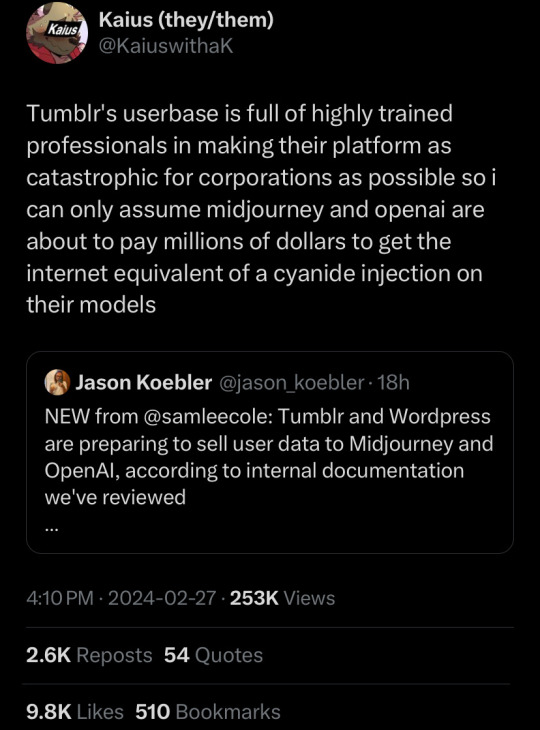
103K notes
·
View notes
Text
There was a paper in 2016 exploring how an ML model was differentiating between wolves and dogs with a really high accuracy, they found that for whatever reason the model seemed to *really* like looking at snow in images, as in thats what it pays attention to most.
Then it hit them. *oh.*
*all the images of wolves in our dataset has snow in the background*
*this little shit figured it was easier to just learn how to detect snow than to actually learn the difference between huskies and wolves. because snow = wolf*
Shit like this happens *so often*. People think trainning models is like this exact coding programmer hackerman thing when its more like, coralling a bunch of sentient crabs that can do calculus but like at the end of the day theyre still fucking crabs.
26K notes
·
View notes
Text
Unleashing Consumer Influence: AI's Impact on Smart Advertising
In the rapidly evolving landscape of marketing and consumer behavior, understanding the profound impact of artificial intelligence (AI) on advertising strategies is paramount. At the forefront of this transformative era is Matt Britton, a renowned AI expert speaker, and the Founder & CEO of Suzy, a cutting-edge consumer research platform. With his extensive experience consulting for over half of the Fortune 500 companies and his deep insights into new consumer trends as outlined in his bestselling book "YouthNation," Matt Britton stands out as one of the top keynote speakers in the realm of smart advertising and AI’s influence on consumer behavior.
The Intersection of AI and Consumer Behavior
AI technology is reshaping how brands interact with consumers, offering unprecedented insights and capabilities that were unimaginable just a decade ago. From personalized advertising to predictive consumer analytics, AI is not merely a tool but a game-changer in crafting marketing strategies that are both effective and engaging. Matt Britton, with his profound expertise as an AI keynote speaker, delves deep into these topics, providing a rich narrative that helps businesses understand and harness the power of AI in advertising.
Matt Britton: A Synthesis of Expertise and Vision
As an AI expert speaker, Matt brings a wealth of knowledge, drawing from his pioneering work at Suzy, where real-time consumer insights are helping brands make faster, more informed decisions. His role in consulting for numerous Fortune 500 companies has equipped him with unique perspectives on leveraging AI to not only meet but anticipate consumer demands. His talks are enriched with examples from his professional journey, making complex concepts accessible and actionable for his audience.
Key Themes in Matt Britton’s Keynotes
AI-Driven Consumer Insights
Understanding consumer behavior has always been at the heart of effective advertising. Matt Britton’s keynotes highlight how AI technologies like machine learning and natural language processing can uncover deep insights into consumer preferences and behaviors. These insights are crucial for brands looking to tailor their marketing efforts to not just reach but resonate with their target audience.
Personalization at Scale
In his speeches, Matt often emphasizes the role of AI in achieving personalization at a massive scale. He explains how AI can analyze vast amounts of data to create personalized marketing messages that speak directly to the individual consumer, significantly boosting engagement and conversion rates.
Predictive Analytics in Marketing
Another significant aspect that Matt covers is the use of predictive analytics to forecast future buying behaviors and trends. This allows companies to be proactive rather than reactive, a shift that can mean the difference between leading the market and lagging behind.
Ethical Considerations and Consumer Trust
With great power comes great responsibility. Matt Britton does not shy away from discussing the ethical implications of using AI in advertising. He talks about the importance of maintaining consumer trust by using AI responsibly, ensuring privacy, and promoting transparency.
Why Matt Britton is Among the Top Conference Speakers
Organizers of leading conferences are constantly on the lookout for innovation speakers who can not only draw in an audience but also leave them enlightened and inspired. Matt Britton’s ability to connect with his audience, supported by his authoritative knowledge and engaging delivery, makes him a preferred choice among top conference speakers. His sessions are not just talks but engaging narratives that challenge conventional thinking and encourage innovation.
Impact of Matt Britton’s Keynotes on Businesses
Business leaders and marketers who have attended Matt’s sessions find themselves better equipped to navigate the complexities of modern marketing landscapes. They gain not just theoretical knowledge but practical insights that can be immediately applied to their marketing strategies. The case studies, real-life examples, and current statistics that Matt includes in his talks enhance their relevance and applicability.
Conclusion
In conclusion, as businesses grapple with the fast-paced changes brought about by advancements in AI, engaging with thought leaders like Matt Britton becomes essential. His keynotes serve as a beacon for businesses aiming to utilize AI not just as a tool for automation, but as a strategic ally in understanding and influencing consumer behavior. Whether you’re a marketer, a business leader, or an entrepreneur, attending one of Matt Britton’s keynotes could significantly demystify the complexities of AI in advertising and provide you with the insights needed to thrive in this new era.
0 notes
Text
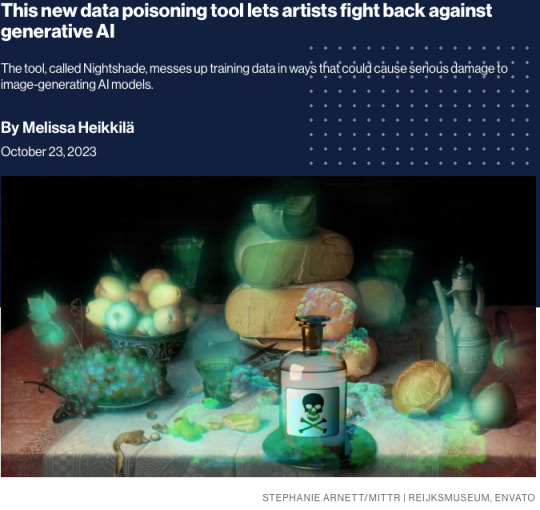
A new tool lets artists add invisible changes to the pixels in their art before they upload it online so that if it’s scraped into an AI training set, it can cause the resulting model to break in chaotic and unpredictable ways.
The tool, called Nightshade, is intended as a way to fight back against AI companies that use artists’ work to train their models without the creator’s permission. Using it to “poison” this training data could damage future iterations of image-generating AI models, such as DALL-E, Midjourney, and Stable Diffusion, by rendering some of their outputs useless—dogs become cats, cars become cows, and so forth. MIT Technology Review got an exclusive preview of the research, which has been submitted for peer review at computer security conference Usenix.
AI companies such as OpenAI, Meta, Google, and Stability AI are facing a slew of lawsuits from artists who claim that their copyrighted material and personal information was scraped without consent or compensation. Ben Zhao, a professor at the University of Chicago, who led the team that created Nightshade, says the hope is that it will help tip the power balance back from AI companies towards artists, by creating a powerful deterrent against disrespecting artists’ copyright and intellectual property. Meta, Google, Stability AI, and OpenAI did not respond to MIT Technology Review’s request for comment on how they might respond.
Zhao’s team also developed Glaze, a tool that allows artists to “mask” their own personal style to prevent it from being scraped by AI companies. It works in a similar way to Nightshade: by changing the pixels of images in subtle ways that are invisible to the human eye but manipulate machine-learning models to interpret the image as something different from what it actually shows.
Continue reading article here
#Ben Zhao and his team are absolute heroes#artificial intelligence#plagiarism software#more rambles#glaze#nightshade#ai theft#art theft#gleeful dancing
22K notes
·
View notes
Text
ai makes everything so boring. deepfakes will never be as funny as clipping together presidential speeches. ai covers will never be as funny as imitating the character. ai art will never be as good as art drawn by humans. ai chats will never be as good as roleplaying with other people. ai writing will never be as good as real authors
#zylo's posts#ai#ai art#artificial intelligence#chatgpt#chatbots#ai generated#ai technology#ai tools#edit: 10k what the fuck
28K notes
·
View notes
Text
After 146 days, the Writer's Strike has ended with a resounding success. Throughout constant attempts by the studios to threaten, gaslight, and otherwise divide the WGA, union members stood strong and kept fast in their demands. The result is a historic win guaranteeing not only pay increases and residual guarantees, but some of the first serious restrictions on the use of AI in a major industry.
This win is going to have a ripple effect not only throughout Hollywood but in all industries threatened by AI and wage reduction. Studio executives tried to insist that job replacement through AI is inevitable and wage increases for staff members is not financially viable. By refusing to give in for almost five long months, the writer's showed all of the US and frankly the world that that isn't true.
Organizing works. Unions work. Collective bargaining how we bring about a better future for ourselves and the next generation, and the WGA proved that today. Congratulations, Writer's Guild of America. #WGAstrong!!!
#gingerswagfreckles#wga#writer's strike#wga strong#wga strike#do the write thing#sag#sag aftra#sag afta strike#unions#Hollywood#according to the news the strike isnt technically over until a vote can be ratified on Tuesday but in practice its over#pickets r called off immediately amd they got almlst everything theu wanted#so its gonna be ratified for sure#current events#news#AI#artificial intelligence
38K notes
·
View notes
Text
Fans' attitudes toward AI-generated works
Irissa Cisternino, a PhD candidate of Stony Brook University, is writing their research on topics related to technology, art and fandom. You can participate by filling out a survey and additionally, signing up for an interview. The survey is expected to last until at least the end of April, those, who signed up for the interview, will be contacted later. You need to be at least 18 years old to participate in either, be able to understand and speak English and identify as a fan.
After the completion of the research, it will be accessible as the dissertation of the researcher. If you have further questions, you can contact Irina Cisternino at [email protected] or Lu-Ann Kozlowsky at [email protected].
14K notes
·
View notes
Text
UPDATE! REBLOG THIS VERSION!
#reaux speaks#zoom#terms of service#ai#artificial intelligence#privacy#safety#internet#end to end encryption#virtual#remote#black mirror#joan is awful#twitter#instagram#tiktok#meetings#therapy
23K notes
·
View notes
Text
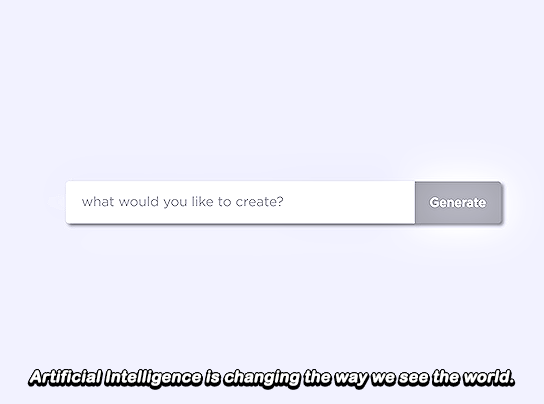




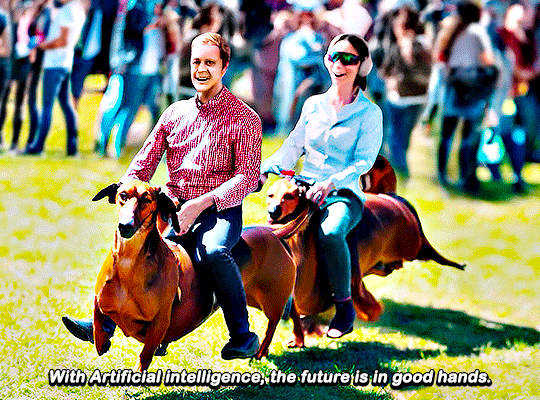


Despicable Me 4 - Minion Intelligence (Big Game Spot)

#superbowl#super bowl#despicable me#byaurore#userbbelcher#tuserrachel#usersugar#nessa007#tuserpris#userallisyn#usereena#userelio#tuserhan#tuserrobin#userkam#userrlaura#ai#artificial intelligence#minions
9K notes
·
View notes
Text
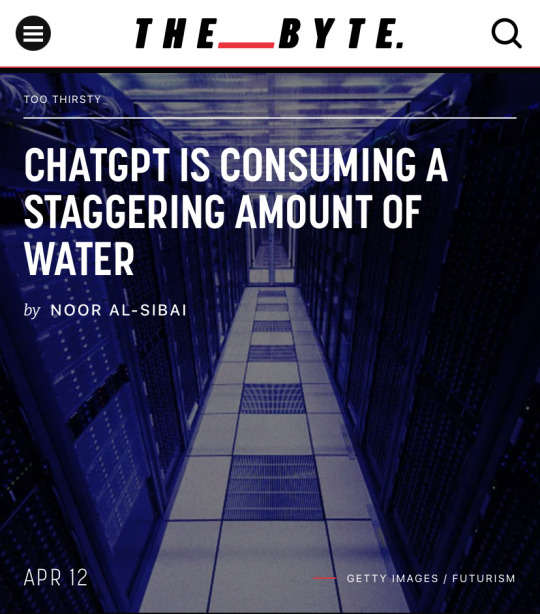
So it turns out that ChatGPT not only uses a ton shit of energy, but also a ton shit of water. This is according to a new study by a group of researchers from the University of California Riverside and the University of Texas Arlington, Futurism reports.
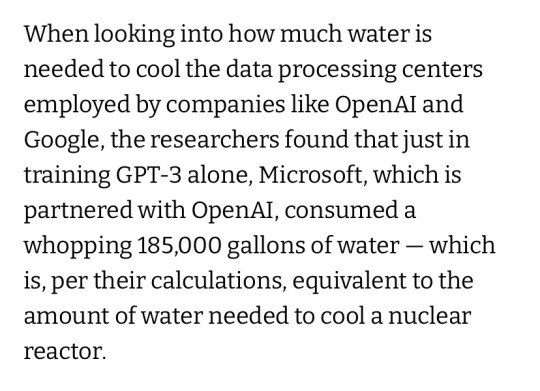
Which sounds INSANE but also makes sense when you think of it. You know what happens to, for example, your computer when it’s doing a LOT of work and processing. You gotta cool those machines.
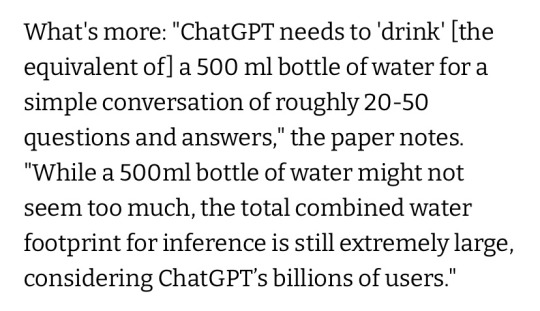
And what’s worrying about this is that water shortages are already an issue almost everywhere, and over this summer, and the next summers, will become more and more of a problem with the rising temperatures all over the world. So it’s important to have this in mind and share the info. Big part of how we ended up where we are with the climate crisis is that for a long time politicians KNEW about the science, but the large public didn’t have all the facts. We didn’t have access to it. KNOWING about things and sharing that info can be a real game-changer. Because then we know up to what point we, as individuals, can have effective actions in our daily lives and what we need to be asking our legislators for.
And with all the issues AI can pose, I think this is such an important argument to add to the conversation.
Edit: I previously accidentally typed Colorado instead of California. Thank you to the fellow user who noticed and signaled that!
#lem talks#let’s get political#science#science tumblr#politics#research#artificial intelligence#AI#climate#important
39K notes
·
View notes
Text

53K notes
·
View notes
Text

A little-discussed detail in the Lavender AI article is that Israel is killing people based on being in the same Whatsapp group [1] as a suspected militant [2]. Where are they getting this data? Is WhatsApp sharing it?
Lavender is Israel's system of "pre-crime" [3] - they use AI to guess who to kill in Gaza, and then bomb them when they're at home, along with their entire family. (Obscenely, they call this program "Where's Daddy").
One input to the AI is whether you're in a WhatsApp group with a suspected member of Hamas. There's a lot wrong with this - I'm in plenty of WhatsApp groups with strangers, neighbours, and in the carnage in Gaza you bet people are making groups to connect.
But the part I want to focus on is whether they get this information from Meta. Meta has been promoting WhatsApp as a "private" social network, including "end-to-end" encryption of messages.
Providing this data as input for Lavender undermines their claim that WhatsApp is a private messaging app. It is beyond obscene and makes Meta complicit in Israel's killings of "pre-crime" targets and their families, in violation of International Humanitarian Law and Meta's publicly stated commitment to human rights. No social network should be providing this sort of information about its users to countries engaging in "pre-crime".
#yemen#jerusalem#tel aviv#current events#palestine#free palestine#gaza#free gaza#news on gaza#palestine news#news update#war news#war on gaza#war crimes#gaza genocide#genocide#ai#artificial intelligence
6K notes
·
View notes
Text
I love you robots and artificial intelligence with mental illness. I love you repression being depicted as literally deleting archived data to preserve functionality. I love you anxiety attacks being depicted as a system crashing virus. I love you ptsd being depicted as an annoying pop-up. I love you anxiety disorder being depicted as running thousands of simulations and projected outcomes. I love you artificial beings being shown to be human via their own artificiality.
#robots#artificial intelligence#tropes#rvb#red vs blue#yugioh vrains#wolf 359#star trek#transhumanism#posthumanism
15K notes
·
View notes
Text
AI Revolutionizing Consumer Fashion: Insights from Matt Britton
In the dynamic intersection of technology and retail, artificial intelligence (AI) is revolutionizing how consumers interact with fashion brands, influencing their shopping habits in profound ways. At the forefront of understanding and articulating these changes is Matt Britton, a renowned AI keynote speaker, consumer trend expert, and the founder and CEO of Suzy, a cutting-edge consumer research platform.
Matt Britton has not only consulted for over half of the Fortune 500 companies, helping them navigate the complex landscape of modern consumer behaviors but has also cemented his authority with his bestselling book, YouthNation. This background makes him an invaluable resource in discussing the ramifications of AI on consumer fashion and shopping habits. His insights are particularly relevant today as companies seek to align themselves with the rapidly evolving market dynamics driven by technological advancements.
The Influence of AI on Consumer Fashion: A Deep Dive
Understanding AI’s Role in Fashion Consumerism
AI is more than just a technological buzzword; it's a pivotal force in reshaping how fashion brands create, market, and sell products. AI systems analyze vast amounts of data to identify trends, predict consumer behavior, and even personalize shopping experiences. Brands that leverage AI effectively can anticipate what consumers desire, sometimes even before the consumers themselves are aware of these desires.
Personalization at Scale
One of the key aspects where AI is making a significant impact is in personalizing the consumer experience. Through AI algorithms, fashion retailers can recommend products uniquely suited to individual tastes, purchase history, and even current trends. This not only enhances the customer experience but also boosts brand loyalty and sales. Matt Britton, with his extensive expertise in consumer trends and AI applications, highlights how personalization is moving from a marketing advantage to a consumer expectation.
Sustainable Fashion Choices
Increasingly, consumers are becoming conscious of the environmental impact of their fashion choices. AI helps brands track and analyze consumer behavior around sustainable practices, allowing them to tailor their offerings to meet this rising demand. For instance, AI can optimize inventory levels to reduce waste, suggest sustainable alternatives, and even aid in the development of eco-friendly materials. As an innovation speaker, Matt Britton can dissect these complex processes into understandable insights, showing how AI not only drives consumer choice but also underpins corporate responsibility.
The Impact on In-Store Experiences
Even as online shopping grows, the in-store experience remains crucial. AI is transforming these physical experiences by integrating virtual fitting rooms, AI-driven stylist assistants, and personalized shopping guides. Matt Britton often discusses how these innovations not only enhance customer satisfaction but also create rich data points that brands can use to further refine their strategies.
AI’s Influence on Fashion Design and Production
AI extends its reach into the design and production phases of fashion as well. It aids designers by predicting upcoming trends and consumer preferences, which informs their creative processes. Furthermore, AI-driven robots and automated systems are becoming commonplace in production lines, improving efficiency and precision. Matt Britton's discussions often explore how these advancements are not replacing human creativity but rather enhancing it, allowing designers and brands to deliver products that are both innovative and aligned with consumer desires.
Why Matt Britton is the Ideal Speaker on This Topic
Expertise and Experience
With his role at Suzy and his extensive consulting experience, Matt Britton brings a wealth of knowledge about the intersection of AI, consumer behavior, and market trends. His insights are grounded in real-world applications and enriched by his direct involvement in the evolution of consumer research methods.
Engaging Speaking Style
As a top keynote speaker and one of the leading conference speakers, Matt has a reputation for delivering engaging, insightful, and highly informative presentations. His ability to connect with his audience, whether they are industry veterans or newcomers, makes his sessions not only educational but also inspiring.
Forward-Thinking Perspectives
Always on the cusp of emerging trends, Matt’s perspectives push the boundaries of current thinking. His talks are peppered with case studies, real-world examples, and forward-thinking predictions that are crucial for businesses looking to thrive in a tech-dominated landscape.
In conclusion, as businesses in the fashion industry continue to navigate the challenges and opportunities presented by AI, engaging with thought leaders like Matt Britton becomes increasingly important. His deep understanding of both the technological aspects and consumer behavior dynamics makes him an ideal AI expert speaker for any conference focusing on the future of fashion and retail. His insights can help brands understand and leverage AI not just as a tool for operational efficiency, but as a transformative force for customer engagement and brand loyalty.
0 notes
Text
Hey, do y’all remember how Tencent said they were developing faceID AI to identify people in riots, and then they suddenly created an AI art generator to turn your selfies into anime?
Do y’all remember that time that someone discovered facial recognition cameras couldn't see through Juggalo makeup, then Facebook had a fun “see what you'd look like with Juggalo makeup” thing, and then facial recognition cameras could suddenly see through Juggalo makeup?
Do y’all remember how, on Twitter, Elon started a tirade against artists who ask for credit when their art is reposted, and he suddenly he created one of the first big art AI programs?
Do y’all remember how AI destroyed the field of freelance translation, despite the inferiority of the machine translations, because companies didn’t care about the quality of the translations? They just wanted it done for free?
Do y’all know how companies will see a lot of money going into a New Tech Thing (like, say, AI art apps) and will jump to try and implement that New Tech Thing into their tech? For example, how it felt like every big company and celebrity had an NFT to sell?
Just wondering.
90K notes
·
View notes